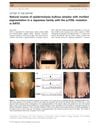April 2015 in “Our Dermatology Online” Zinc supplements and diet changes can effectively treat zinc deficiency and prevent complications.
 11 citations,
September 2022 in “The Journal of Rheumatology”
11 citations,
September 2022 in “The Journal of Rheumatology” Skin problems are common in lupus patients and should be treated early to prevent worsening.
 February 2009 in “Journal of The American Academy of Dermatology”
February 2009 in “Journal of The American Academy of Dermatology” Fractional infrared technology is effective and safe for treating cervical laxity.
[object Object]  February 2009 in “Journal of The American Academy of Dermatology”
February 2009 in “Journal of The American Academy of Dermatology” Fractional infrared technology is effective and safe for treating cervical laxity.
58 citations,
January 2010 in “Arthritis Care & Research” Hydroxychloroquine may help delay skin damage in lupus patients.
 February 2009 in “Journal of The American Academy of Dermatology”
February 2009 in “Journal of The American Academy of Dermatology” Pulsed dye laser treatment was effective for a skin condition resistant to other treatments.
2 citations,
December 2019 in “The Open Dermatology Journal” Linear Discoid Lupus Erythematosus of the scalp can cause hair loss and should be considered in similar cases.
 January 2017 in “IMC Journal of Medical Science”
January 2017 in “IMC Journal of Medical Science” A rare endocrine disorder, APS 1, was diagnosed in a 26-year-old man in Bangladesh.
 5 citations,
January 2020 in “Wiadomości lekarskie (Warsaw Poland)”
5 citations,
January 2020 in “Wiadomości lekarskie (Warsaw Poland)” Patients with both connective tissue disease and acid reflux are more likely to have certain symptoms and physical signs.
 3 citations,
January 2019 in “Journal of Dermatology”
3 citations,
January 2019 in “Journal of Dermatology” The p.P25L mutation in the KRT5 gene causes a rare skin condition that worsens over time and may lead to hair loss starting in young adulthood.
 15 citations,
November 2019 in “Cutaneous and Ocular Toxicology”
15 citations,
November 2019 in “Cutaneous and Ocular Toxicology” Minoxidil tretinoin liposomal based hydrogel shows promise for effective treatment of hair loss by delivering both drugs at the same time.
 March 2024 in “GSC Advanced Research and Reviews”
March 2024 in “GSC Advanced Research and Reviews” Different light affects cell functions and can help treat skin conditions.
 June 2021 in “International journal of research in dermatology”
June 2021 in “International journal of research in dermatology” Shaving and avoiding brushing improved the patient's beard hair condition.
 1 citations,
September 2015 in “Clinics in Dermatology”
1 citations,
September 2015 in “Clinics in Dermatology” The guide helps doctors diagnose hair problems by suggesting a thorough patient history, physical exams, and various diagnostic tools.
[object Object]  January 2024 in “Pakistan Journal of Medicine and Dentistry”
January 2024 in “Pakistan Journal of Medicine and Dentistry” An 18-year-old girl improved with treatment after being diagnosed with both Systemic Lupus Erythematosus and Celiac Disease.
 15 citations,
February 2014 in “BMC Research Notes”
15 citations,
February 2014 in “BMC Research Notes” The X5 Hairlaser might help treat male hair loss, but more research is needed.
 36 citations,
August 2018 in “Dermatologic Clinics”
36 citations,
August 2018 in “Dermatologic Clinics” Trichoscopy is a useful tool for diagnosing hair disorders without pulling out hair.
 May 2022 in “Annals of the Rheumatic Diseases”
May 2022 in “Annals of the Rheumatic Diseases” It's unclear if COVID-19 vaccination causes SLE; more research is needed.
 June 2018 in “Surgical Case Reports”
June 2018 in “Surgical Case Reports” S-1 treatment led to a complete response in pancreatic cancer with manageable side effects.
 1 citations,
September 2015 in “Clinics in Dermatology”
1 citations,
September 2015 in “Clinics in Dermatology” Children's skin diseases and treatments differ from adults and require specific approaches.
 1 citations,
January 2021 in “Arthritis Research & Therapy”
1 citations,
January 2021 in “Arthritis Research & Therapy” About 8% of people with systemic lupus erythematosus have chronic scarring alopecia, with certain symptoms and positive antibodies increasing the risk, while immunosuppressants may lower it.
4350 citations,
May 2012 in “Arthritis & Rheumatism” The new SLICC criteria for diagnosing lupus are more sensitive and accurate than the old criteria.

















